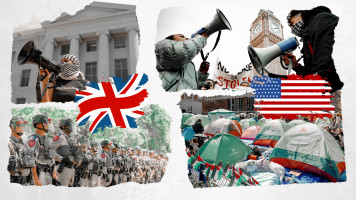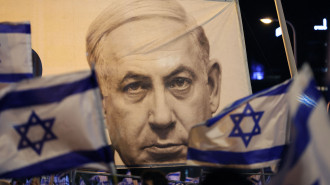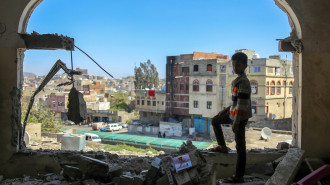
Iraqi Kurdistan's balancing act in Israel's war on Gaza

After one month of Israel's war on Gaza, authorities in Iraq’s Kurdistan Region have remained largely silent. They have numerous, overlapping political relationships hanging in a delicate arrangement that could be upset if the war escalates across the Middle East.
Erbil has strong ties with the US, but Iran also plays a significant role and can exert strong military, political, and economic force.
The Kurdistan Region, “is a pro-American island in a sea of anti-American sentiment. If the war escalates, there will be pressure on it from both sides,” Mujge Kucukkeles, a research associate at London-based think tank Global Partners Governance, told The New Arab.
Even if Kurdish officials say nothing, there is a high risk of being caught in the crossfire.
"Erbil has strong ties with the US, but Iran also plays a significant role and can exert strong military, political, and economic force"
Since 18 October, militias supported by Iran that call themselves the Islamic Resistance in Iraq have claimed at least six attacks on bases in the Kurdistan Region that host US troops, including Erbil and Harir air bases.
Over the past three years, these facilities have been repeatedly targeted by Iran’s Islamic Revolutionary Guards Corps (IRGC) and the Iraqi militias, which put nearby civilians at risk.
The presence of foreign troops in the Kurdistan Region provides important political and military support for the Kurdish authorities,who do not want to lose or complicate that relationship as part of a regional war.
“I think the crucial aspect in that kind of scenario would be how committed the Americans are,” to the Kurdistan Regional Government (KRG), said Kucukkeles.
So far, the only major Kurdish politician to comment at any length on the ongoing war in Gaza is Kurdistan Region President Nechirvan Barzani, who is a member of the Kurdistan Democratic Party (KDP). He has addressed the issue twice, once at a conference in Erbil on10 October and during a visit to Paris on 3 November.
“Our position is that we do not want Iraq to become part of these problems,” Barzani told reporters following a meeting with French President Emmanuel Macron.
“An appropriate solution must be found in the long run. In the near future, a ceasefire must be declared and humanitarian aid must reach Gaza.”
“What is being done in Gaza today is not right,” he added.
Despite his title, President Barzani plays a largely ceremonial role. The real power lies with his cousin, KRG Prime Minister Masrour Barzani, who has studiously avoided commenting.
|
|
The Kurdistan Region’s other ruling party, the Patriotic Union of Kurdistan (PUK), has not released a specific statement on the war. The most direct comment came when a relatively low-level party official met with the Palestinian consul general in Erbil on 2 November and expressed the party’s hope for a “peaceful solution through dialogue and negotiation.”
Over the past two years, PUK leader Bafel Talabani has developed close ties with Iran-backed parties in Baghdad. He is a regular visitor to the Iraqi capital for meetings with figures like Hadi al-Amri and Qais al-Kazhali, both of whom have issued threats to the US warning it about the possibility of a broader conflict.
Talabani was scheduled to visit Washington in recent weeks, but the trip was quietly scrubbed. He is reportedly dealing with internal matters following a contentious party congress in September.
Nevertheless, the cancellation means that he is able to duck potentially embarrassing questions about his political allies in Baghdad and their position on the Gaza war.
"Should the Kurdish authorities take a pro-US and Israel tilt in the war on Gaza, Iran-backed parties in Baghdad could decide to turn up this pressure"
Tacitly reinforcing the notion that the Kurdistan Region’s ruling parties are hoping to avoid taking a position on the conflict, requests for comment by The New Arab to KDP officials and advisors to KRG Prime Minister Barzani were not returned in time for publication. A request for comment sent to the PUK’s spokesperson was similarly not returned.
“They want to maintain a balance in the middle and appear neutral in the current war,” Kurdish commentator Abubakr Karwani told The New Arab. “In other words, they will express sympathy for the Palestinians as a moral issue and consider the Kurdistan Region and its people to be uninvolved.”
In contrast, the Kurdistan Region’s two Islamist parties — the Kurdistan Islamic Union (KIU) and the Kurdistan Justice Group (KJG) — have loudly condemned Israel’s bombardment of Gaza, though their ability to hold public protests about the issue is restricted.
Karwani said that the Islamist parties see the conflict as, “a political problem with a religious dimension.”
“They have no clear vision for a solution to the problem…What they are doing in Kurdistan is nothing more than giving sympathy,” he added.
Ordinary Kurds are also watching Gaza closely. Not only are they concerned of the potential for escalation, but they see a hypocrisy in how the world has responded to the suffering of Palestinians in Gaza while ignoring attacks on Kurds by Turkey and Iran.
“Kurds feel that for most regimes and Islamist movements in the region, what matters is not the human suffering, but the identity of those who suffer,” Kucukkeles said.
“While there is a sense of empathy with the Palestinian suffering, they also feel that there’s an immense double standard against them. This is leading the Kurds to refrain from showing any public support for Palestinians, along with those who oppress them,” she added.
There are also economic considerations. Until the Kurdistan Region’s independent oil exports were suspended in March 2023, Israel was a major destination of Kurdish crude starting in 2014. According to media reports, it received 183,000 barrels per day in February, although the amount fluctuated from month to month.
While this trade is no longer occurring given the continued suspension of exports, lingering suspicions regarding that relationship could colour how Tehran and others view Erbil’s positioning.
Oil prices have remained relatively stable despite the war. Should they increase in the coming months, the KRG will likely miss out on that financial boost, given that it is no longer exporting oil.
In the past, high oil prices have allowed Erbil to address its financial liabilities by distributing public sector salaries or paying debts to international oil companies. In the post-export era, the Kurdistan Region is reliant on funds from Iraq’s federal government, which firmly holds the purse strings and has proved willing to use them to extract political concessions.
Should the Kurdish authorities take a pro-US and Israel tilt in the war on Gaza, Iran-backed parties in Baghdad could decide to turn up this pressure and completely suspend cash transfers to Erbil. This move would be disastrous economically for the Kurdistan Region.
As a result, Kurdish leaders are holding their breath and hoping that they are not drawn into a broader escalation.
Winthrop Rodgers is a journalist and analyst based in Sulaymaniyah in Iraq’s Kurdistan Region. He focuses on politics, human rights, and political economy.
Follow him on Twitter and Instagram: @wrodgers2
![Although the KRG has no official ties with Israel, the two governments have economic ties and Israel has supported the establishment of an independent Kurdish state. [Getty]](/sites/default/files/styles/large_16_9/public/853026076.jpeg?h=7001ab39&itok=XqPCevhD)


